-Irish Proverb"A good laugh and a long sleep are the best cures in the doctor's book."
The Pink Crusader is a bit under the weather but promises to be back next week...ready, willing and able. Until then take care, stay well, and have a most excellent week. Read on for updates....
---------------------------------------------------------------------
FYI:
From Paul A. Levine, MD, FHRS, FACC:
Spread the word!! We all carry our mobile phones with names & numbers stored in its memory but nobody, other than ourselves, knows which of these numbers belong to our closest family or friends.
If we were to be involved in an accident or were taken ill, the people attending us would have our mobile phone but wouldn't know who to call. Yes, there are hundreds of numbers stored but which one is the contact person in case of an emergency? Hence this "ICE" (In Case of Emergency) Campaign.
The concept of "ICE" is catching on quickly. It is a method of contact during emergency situations. As cell phones are carried by the majority of the population, all you need to do is store the number of a contact person or persons who should be contacted during emergency under the name "ICE" ( In Case of Emergency).
The idea was conceived by a paramedic who found that when he went to the scenes of accidents, there were always mobile phones with patients, but they didn't know which number to call. He therefore thought that it would be a good idea if there was a nationally recognized name for this purpose. In an emergency situation, Emergency Service personnel and hospital Staff would be able to quickly contact the right person by simply dialing the number you have stored as "ICE." For more than one contact name, simply enter ICE1, ICE2 and ICE3 etc.
Let's spread the concept of ICE by storing an ICE number in our Mobile phones today! Please forward this. It won't take too many "forwards" before everybody will know about this It really could save your life, or put a loved one's mind at rest . ICE will speak for you when you are not able to.
Source: Circulated e-mail
***********************************
From Y-Me Advocacy:
Join the Y-ME Advocacy network as we influence legislation and progress in the fight to end breast cancer!
With the primary election season upon us and the general election only months away, 2008 is an exciting year for the breast cancer community. Get involved with Y-ME Advocacy and empower yourself to create change for better research, treatment, prevention and a cure.
Y-ME Advocacy constantly monitors key legislation affecting the breast cancer community. When you join Y-ME Advocacy, you will receive a special alert when the time is right to take action. We will provide you with the tools you need to contact your legislator and let them know where you stand. One individual cannot fight cancer alone, but together we can make a difference!
http://capwiz.com/y-me/mlm/signup/
*************************************
From M. D. Anderson Cancer Center Public Education Office:
National Cancer Institute's Cancer Information Service 1-800-4-CANCER
Cancer is the second leading cause of death in the United States, and a critical strategy in cancer control efforts is the education of Americans about steps they can take to prevent cancer, detect it early when treatment is most likely to be effective, and choose the best treatment plan.
For nearly 30 years, the National Cancer Institute's Cancer Information Service has been providing the latest and most accurate cancer information to patients, their families, health professionals, and the public. Through its network of regional offices and partnerships with nonprofit, private, and other government agencies, the CIS reaches people who do not traditionally seek health information. For those who do seek information, the CIS offers a toll-free telephone number (1-800-4-CANCER) and an instant messaging service (LiveHelp) on the NCI's Web site (http://www.cancer.gov/ ). You can learn more about CIS at www.cancer.gov/cis or by calling 1-800-4-CANCER.
M. D. Anderson is under contract with the National Cancer Institute (Contract #HHSN261200511010C) to administer the Cancer Information Service’s Partnership Program and Research Coordination Program. The Partnership Program serves Texas and Oklahoma, and the Research Coordination Program serves Montana, Wyoming, North Dakota, Minnesota, South Dakota, Wisconsin, Iowa, Utah, Colorado, Nebraska, Kansas, Missouri, Illinois, Arizona, New Mexico, Texas and Oklahoma.
****************************************
From Jane Weiner:
Special 5 week Wednesday night 6:30-8 p.m. Modern Class Series with Jackie Nalett--- January 9-February 6 (Live music with Chris Shooner)
Jacqueline is adjunct faculty at the UH where she teaches modern dance, jazz, and creative movement. She is on staff at Rice University where she teaches jazz and hiphop dance and is a dance teaching artist with Young Audiences of Houston. Her technique classes are based in proper alignment and technique and are abundant in high energy and dynamic physicality. She received her B.A. in dance from Mount Holyoke College in South Hadley, Massachusetts where she focused on modern and jazz with former Bill Evans dancers Debbie Poulsen and Terese Freedman. While at MHC, staff musician/composer Peter Jones was a huge influence on Jackie's dance education. Her choreography has been presented at the American College Dance Festivals in New England and Texas, at Mount Holyoke College, the University of Houston, Rice University,and the Houston Jewish Community Center's Summer Series. During the summer of 2007 she choreographed and performed a solo work entitled "Impulse" as part of the Gathering at the Big Range Dance Festival.
Finally---
we still have 3 scholarships open for our Teen Arts program (meets Tuesday & Thursday after school) Call the office or e-mail us if interested...and two scholarships available for our children's Capoeira class Monday @ 4 p.m. An artist is a terrible thing to waste!!!!
Sincerely, Jane Weiner, Hope Stone, Inc.
Hope Stone, Inc. is a unique organization dedicated to presenting authentic dance, music and theater performances, as well as embracing and nurturing the creative and expressive side of children through the positive empowering expression of the performing arts. http://www.hopestoneinc.org/
********************************
From Beth Irvine:
Hi Everyone,
I have been busy with my 10 city TV media tour, Healthy Living with Beth Irvine. I was trying to think of a way to stay connected with everyone while I was on the road as so many people have asked for me to stay in touch. So I have decided to keep a blog tour going about my month away. Check in every few days to hear the ups and downs of life on the road. Check out my first leg...Media Tour or Spiritual Journey?
I have decided that my media tour is going to be my "spiritual journey" through the month of January. Consider this your personal invitation. Come along on the road and join me. www.truewellbeing.net/TRUEWELLBEING/Blog/Blog.html
With very best wishes, Elizabeth Irvine, BSN
Truewellbeing
****************************************
From Cheryl Donlin:
Josie,
My beautiful daughter sent this link to me. Thought you'd find the article interesting. Work. Create. Grow. Give. - Cheryl
10 Breast Cancer Myths Debunked
If you believe any of them, you've been duped — or worse.
By Marisa Weiss, MD, with Barbara Loecher, Prevention
Could that sexy underwire bra cause breast cancer? What about that frozen yogurt you just ordered? Or hormone therapy? And how would you know if you had the disease until it was too late anyway? Don't some studies show that examining your breasts and getting mammograms are useless?
Amid all the rumors and controversies surrounding breast cancer these days what causes it, how to diagnose and treat it it's hard to know what to think. Or do. One thing we can tell you is that being able to separate fact from fiction could make the difference between life and death.
Myth 1: Having a risk factor for breast cancer means you'll develop the disease.
No risk factor either alone or in combination with others means you'll definitely get breast cancer. There are various factors that may increase your risk of developing the disease. Some of these appear to increase your risk only slightly. They include smoking, drinking (more than five alcoholic drinks per week year after year), getting your first menstrual period before age 12, continuing to have periods after age 55, and not having your first full-term pregnancy until after age 30. If you have a number of these, the increase in risk can start to be more meaningful.
That said, even an inherited genetic abnormality in your family doesn't necessarily mean you're going to get breast cancer. Abnormalities in the so-called breast cancer genes BRCA1 and BRCA2 are very strong risk indicators. But 20 to 60 percent of women with these inherited abnormalities will not develop breast cancer.
Myth 2: If there is no breast cancer in your family, then you're not at risk for the disease.
Every woman is at risk for breast cancer. So are some men! For any individual woman, an inherited abnormality is the strongest risk factor, but only about 10 percent of all cases of breast cancer are due to inherited abnormalities. About 85 percent of women who develop the disease don't have a family history. That's why it's important for all women to get screened regularly.
Myth 3: Breast cancer is passed only from your mother, not your father.
We now know that breast cancer genes can be inherited from your dad's side of the family. So ask relatives about cases on both sides and in both men and women. About 2,000 cases of male breast cancer are diagnosed in the US each year. In fact, male breast cancer is most closely associated with a BRCA2 abnormality. So if there's a man in the family who's had breast cancer, be sure to tell your doctor.
Myth 4: No matter what your risk factors are, you really don't have to worry about breast cancer until you're through menopause.
The odds of getting the disease do increase as you age. But breast cancer can occur at any age. That's why all women need to be vigilant. Though experts recommend yearly mammograms starting at age 40, your doctor may suggest that you start even earlier if you have a family history of breast cancer at a young age.
Mammography isn't the ideal screening test for women younger than 40 because it can't "see through" their dense breast tissue. So your doctor may also recommend ultrasound or magnetic resonance imaging (MRI). You may be able to enroll in a study of MRI for breast cancer detection for women at increased risk.
Myth 5: Wearing a bra or using antiperspirants and deodorants increases your risk of breast cancer.
These are two Internet rumors that never seem to quit. It's not true that wearing a bra, especially underwire bras, traps toxins by limiting lymph and bloodflow in your breasts, increasing risk. There's also no proof for the claims that antiperspirants and deodorants cause cancer by keeping the body from sweating out the cancer-causing substances that build up in the breasts, or because they contain harmful chemicals that are absorbed through the skin.
Myth 6: If you have small breasts, you're much less likely to get breast cancer.
Size doesn't matter. Anyone with breasts can get it.
Myth 7: Research shows that using hormone therapy (HT) ” even for a short period of time — causes breast cancer.
Many women were understandably concerned when a major study found that HT combining estrogen and progestin increased risks of invasive breast cancer slightly. Another study also showed that combination therapy boosts breast cancer risk somewhat, however, it was able to offer some reassurance: This risk appeared to return to normal within a year or so after women stopped using the therapy. This seems to be the case for women who've been on HT for just months and those who've used it for more than 5 years.
One more thing: It's important to note that no studies have found a boost in breast cancer risk for women using estrogen-only therapy. This type of therapy is prescribed solely for women who have had hysterectomies, because estrogen taken alone can cause cancer in the lining of the uterus (endometrial cancer).
Myth 8: Eating high-fat foods and dairy products boosts your risk.
A number of studies have found that women who live in countries where diets tend to be lower in fat have a lower risk of breast cancer. But the majority of studies focusing on women in the US haven't found a solid link between dietary fat consumption and breast cancer risk. Why are these findings contradictory? It may be that women in other countries are at lower risk for other reasons: They exercise more, eat less, weigh less, smoke less, or have a different genetic profile or environmental interaction that makes them less susceptible. One thing we do know: Postmenopausal obesity is a risk factor that does put you at risk for breast and other cancers, so it pays to maintain a healthy weight.
As for dairy products, the study results are mixed. But Harvard's Nurses' Health Study, a large-scale study of 120,000 women, recently found that premenopausal women who ate a lot of dairy products, especially low-fat and fat-free ones, ran a lower risk of breast cancer. The study found no link between dairy product consumption and breast cancer risk in women who are past menopause.
Myth 9: Mammograms can prevent breast cancer.
A 2003 Harris survey of more than 500 women found that about 30 percent thought mammograms could prevent breast cancer. The truth: While mammograms can detect breast cancer, they can't prevent it.
Myth 10: Some studies actually show mammograms are worthless.
Two studies, including a review study done by Danish scientists, did suggest that getting a regular mammogram didn't lower a woman's risk of dying of breast cancer. But several other studies, including one done by the US Preventive Services Task Force, totally disagree. You can maximize the benefit of mammography screening by seeking out the best facilities and staff in your area. Look for the radiology center that handles the most breast cancer cases in the region. Go to a radiologist who specializes in reading mammograms, and ask, "How many mammograms do you read each year?" More tends to be better. A study published in the Journal of the National Cancer Institute found that radiologists who read more than 300 mammograms a month were more accurate.
Source: - MSN Health & Fitness - Breast Cancer http://www.health.msn.com/
1=10803">http://health.msn.com/health-topics/breast-cancer/articlepage.aspx?cp-documentid=100171812>1=10803
Disclaimer: MSN Health & Fitness does not provide medical or any other health care advice, diagnosis or treatment. DO NOT RELY ON The MSN Web Sites OR ANY CONTENT ACCESSED ON OR THROUGH THEM FOR MEDICAL ADVICE - CONSULT YOUR PHYSICIAN.
*************************************
From Donna Fong:
Device can spot cancer cells in blood: U.S. Study
Wed Dec 19 20:21:14 UTC 2007
By Julie Steenhuysen
CHICAGO (Reuters) - A highly sensitive microchip may help doctors detect rare traces of cancer circulating in the bloodstream, offering a way to better manage treatment, U.S. researchers said on Wednesday.
The device can isolate, count and analyze circulating tumor cells from a blood sample, the team at Massachusetts General Hospital and Harvard Medical School in Boston said. These circulating tumor cells, or CTCs, are the tiniest fragments of tumors, which are carried in the blood. Doctors have known about them for some time, but because they are so rare and so fragile, they have been hard to trap and study in a meaningful way.
"What our technology does is increase the sensitivity many, many fold, to a point where it can become a tool that can be used clinically," said Mehmet Toner, whose group developed the device. He said routine monitoring of these cells could help doctors tailor treatments to patients and may one day aid with diagnosis.
"Nine out 10 deaths in cancer are due to the metastatic process because the cancer spreads to other parts of the body," said Toner, whose study appears in the journal Nature. "These are really the cells that end up killing people."
Current blood tests to detect these rare cells involved many steps of mixing and spinning and shaking, often killing what few cells they found. "We went to the blackboard and designed it from scratch," Toner said in a telephone interview.
TRAPPING CANCER CELLS
The device they made uses a business-card sized silicon chip. It has microscopic posts that are coated with antibodies that recognize cancer cells. As blood flows over the chip, these posts act like glue, trapping cancer cells and leaving blood cells behind. Older methods may have produced one to five cells out of 60 billion cells screened in an 8-milliliter tube of blood. The new device can find 1,000 cancer cells.
The researchers tested their chip against blood samples from 68 patients with five types of tumors -- lung, prostate, breast, pancreatic and colorectal. Out of 116 samples, they found circulating tumor cells in all but one sample, and none were found in samples taken from healthy people. And the test was sensitive enough to detect changes in circulating tumor cell levels during treatment, with drops in detected CTC levels matching tumor shrinkage seen on standard CT scans.
"Suddenly, we have a great opportunity to have an impact in cancer in major ways," Toner said. He said the technology will allow for much more personalized cancer care. "You get a sense of how a patient is responding to treatment." Eventually, it also may prove useful for cancer screening. And ready access to live cancer cells will advance cancer research. "We will start to understand the biology of cancer much better," Toner said. (Editing by Maggie Fox and Xavier Briand)
© Copyright Reuters 2006 All rights reserved. Users may download and print extracts of content from this website for their own personal and non-commercial use only.
© Reuters 2006. All rights reserved. Reuters and the Reuters sphere logo are registered trademarks and trademarks of the Reuters group of companies around the world
*************************************
Combined hormone therapy increases risk of lobular breast cancer fourfold after just three years of use [Fred Hutchinson Cancer Research Center]
SEATTLE — Jan. 15, 2008
Postmenopausal women who take combined estrogen/progestin hormone-replacement therapy for three years or more face a fourfold increased risk of developing various forms of lobular breast cancer, according to new findings by researchers at Fred Hutchinson Cancer Research Center.
"Previous research indicated that five or more years of combined hormone-therapy use was necessary to increase overall breast-cancer risk," said Christopher I. Li, M.D., Ph.D., the lead author of the report, published in the January issue of Cancer Epidemiology, Biomarkers and Prevention. "Our study, the first specifically designed to evaluate the relationship between combined HRT and lobular breast cancers, suggests that a significantly shorter length of exposure to such hormones may confer an increased risk."
The study, which confirms previous reports of the association between combined hormone-therapy use and increased risk of lobular breast cancers, is the largest study of combined HRT and lobular cancer risk in the United States. It is also the first such study to take into account the recency and duration of hormone use and the first to include a centralized pathological review of tumor specimens to confirm their histological type: ductal, lobular or mixed ductal-lobular.
Lobular cancer involves the lobules, or chambers, in the breast that contain milk-producing glands. While lobular carcinoma accounts for only about 15 percent of all invasive breast cancers, it is hormonally sensitive and therefore more treatable than the more common ductal variety, which arises in the ducts that carry milk from the lobules to the nipple. However, lobular breast tumors also present a clinical challenge because they are more difficult to detect both by clinical examination and by mammography than ductal cancers, which account for about 70 percent of invasive breast cancers in the United States.
The study assessed hormone-replacement status in more than 1,500 postmenopausal women in western Washington — 1,044 breast-cancer cases (324 lobular, 196 mixed ductal-lobular and 524 ductal) and 469 controls. The researchers also confirmed tumor status through centralized examination of breast tissue.
The researchers found that current users of combined HRT had a 2.7-fold and 3.3-fold elevated risk of lobular and ductal-lobular cancer, respectively, regardless of tumor stage, size or number of lymph nodes involved. Only women who used combined HRT for three or more years faced an increased risk of lobular cancer. Among mixed ductal-lobular cases, hormone therapy increased the risk of tumors that were predominantly lobular but not tumors that had predominantly ductal characteristics.
The incidence of invasive lobular and ductal-lobular breast cancers has risen rapidly in the United States, increasing 52 percent and 96 percent, respectively, between 1987 and 1999, whereas rates of ductal cancer have increased only 3 percent during this time.
"Our research suggests that the use of postmenopausal hormone-replacement therapy, specifically the use of combined estrogen-plus-progestin preparations, may be contributing to this increase," said Li, an associate member of the Hutchinson Center's Public Health Sciences Division.
While the number of postmenopausal women taking combined HRT long-term has dropped by about half in recent years due to Women's Health Initiative reports of health risks associated with such therapy, such as an increase in heart-disease and breast-cancer risk, a substantial number of women are still taking HRT to manage the symptoms of menopause.
"These findings are still of considerable public-health importance considering the estimated 57 million prescriptions for menopausal hormone therapy that continue to be filled in the United States," Li said.
The National Cancer Institute funded this research, which involved researchers from the Hutchinson Center's Public Health Sciences and Human Biology divisions as well as the University of Washington School of Medicine.
http://www.fhcrc.org/about/ne/news/2008/01/15/hormone_therapy.html
Source: Reprinted from web site at http://www.fhcrc.org/
Fred Hutchinson Cancer Research Center
At Fred Hutchinson Cancer Research Center, our interdisciplinary teams of world-renowned scientists and humanitarians work together to prevent, diagnose and treat cancer, HIV/AIDS and other diseases. Our researchers, including three Nobel laureates, bring a relentless pursuit and passion for health, knowledge and hope to their work and to the world. For more information, please visit www.fhcrc.org.
****************************************
From American Cancer Society-Houston Metro Office:
2008 Making Strides Against Breast Cancer
We are looking for dedicated and energetic volunteers to serve on this year's committee. Please join us for our first meeting of the year to learn more about MSABC and how you can help!
Monday, January 21, 2008, 6:00 pm
American Cancer Society - Houston Metro Office
6301 Richmond Ave.
Houston, TX 77057
Contact Ashley White, Community Manager-Distinguised Events
at 714-706-5645 Ashley.white@cancer.org
*******************************
From Susan G. Komen for the Cure - Houston Affiliate:
Join the Komen Houston Affiliate for the Pink Tie Gala and After Party which will be held Saturday, February 16, 2008 at the InterContinental Hotel. This year’s event, which is sponsored by Kroger Food Stores, will begin with a cocktail reception and luxury silent auction, followed by a fabulous dinner and exciting live auction. This special evening will be hosted by KPRC-TV’s Khambrell Marshall and will feature entertainment by the legendary comedienne, Lily Tomlin. Winning numerous awards over the years for her amazing performances including six Emmys, two Tonys and a Grammy, Tomlin continues to awe crowds and be an extraordinary entertainer. Tomlin will revisit some of her most favorite characters like Edith Ann from Laugh-In...You don't want to miss this performance!! Individual Gala tickets can be purchased for $350. Tables can be purchased for $5,000. Click here to purchase an individual ticket to the Gala (includes admittance into After Party). https://secure2.convio.net/rfch/site/Ecommerce?VIEW_PRODUCT=true&product_id=1221&store_id=1421&JServSessionIdr003=zzj9gqasx1.app8b
NEW THIS YEAR!!
Grab your friends and put your dancin' shoes on! New to the Gala this year is an exciting After Party sponsored by CenterPoint Energy that will be held in the Discovery Center of the InterContinental Hotel from 9:00 p.m. to 1:00 a.m. The After Party will feature extravagant dessert bars, music by Brotherhood, a party/funk/jazz band featuring vocalist Robert Berry, and dancing. Individual After Party tickets can be purchased for $100.
Click here to purchase an individual ticket to the After Party. https://secure2.convio.net/rfch/site/Ecommerce?VIEW_PRODUCT=true&product_id=1222&store_id=1421
********************************************************
From Fran Visco, President:
National Breast Cancer Coalition (NBCC)
Dispatch from San Antonio
Last month, many from NBCC traveled to San Antonio for the 30th Annual San Antonio Breast Cancer Symposium. This meeting is touted as the largest gathering of scientists in the breast cancer research field. Doctors, researchers, advocates and health care professionals from across the country and around the globe met to share state-of-the-art breast cancer information, including briefings on ongoing and soon-to-be released studies, important new research findings, lectures by experts, and much more.
NBCC led a special advocacy session covering several subjects from the consumer advocate perspective. Erythropoiesis stimulating agents (ESAs), which are used to stimulate the production of red blood cells to reverse anemia caused by chemotherapy, were discussed, as well as anthracyclines, drugs commonly administered in combination chemotherapies to prevent the spread of breast cancer. Discussions about these two forms of treatment are important because data are accumulating regarding their limited value at the cost of serious side effects.
The item in our session provoking the most audience interest was bevacizumab (Avastin) – an innovative therapy designed to inhibit tumor growth by stopping the formation of new blood vessels needed to nourish the tumor – in effect “starving” the tumor. This idea has been around for quite a while, and, despite spectacular cures of mice in the laboratory, results in humans are unclear and seemingly quite modest. Clinical trials have been conducted to see if this therapy will work in fighting breast cancer. The results of two trials were recently presented to the Oncology Drug Advisory Committee (ODAC) of the Food and Drug Administration. ODAC decided against recommending bevacizumab for approval, because data from the clinical trials did not demonstrate that this treatment prolongs the lives of women with advanced breast cancer beyond current treatments; in fact, there were more deaths and serious side effects in the treatment group that included bevacizumab. Another issue discussed among participants was the high cost of newer cancer therapies including bevacizumab. It was a timely discussion, since the FDA is slated to make a final decision on bevacizumab in February.
The failure of this drug to improve survival in patients with breast cancer is a disappointment. However, this story highlights the importance of analyzing full sets of data over the long term and of evaluating specific survival outcomes. Data released over two years earlier had raised expectations that did not pan out, while safety concerns only were revealed with longer follow up. We must keep in mind that when treatments are rushed to patients without solid evidence we can cause more harm than good.
Source: Call to Action Newsletter, January 2008
2008© National Breast Cancer Coalition
---------------------------------------------------------------------------------
DAILY REMINDER #1:
"Fund Free Mammograms" Go to The Breast Cancer Site at http://www.thebreastcancersite.com/tpc/EEB_0115_BCSm and help fund free mammograms for the homeless, working-poor, and un-insured women. It costs nothing to you, except one daily click on the pink "Fund Free Mammograms" button. You can even request automatic reminders via e-mail. Please make your free click now, and thanks for your continuing support! The Breast Cancer Site, One Union Square, 600 University Street, Suite 1000, Seattle, WA 98101 Phone: 1-888-811-5271
DAILY REMINDER #2:
Help eliminate Breast Cancer with a daily click at http://breastcancer.care2.com/ebc-about.html You'll be one of the first people to participate in the largest virtual mountain climb in the world! With every click, (or "step") you generate a donation to eliminate the environmental causes of breast cancer--for free. Sponsors pay for your click and fund The Breast Cancer Fund's programs focusing on environmental links to breast cancer. It only takes a second! The Breast Cancer Fund is the leading national organization focused on identifying – and advocating for the elimination of – the environmental and preventable causes of the disease. For more details on the organization’s work, visit http://www.breastcancerfund.org/
------------------------------------------------------------------------------![]() UPCOMING EVENTS: Mark Your Calendars and Save the Dates!
UPCOMING EVENTS: Mark Your Calendars and Save the Dates!
HOPE STONE, INC.
SATURDAY SAMPLER SERIES
January 19-March 1 11:45-1 p.m.
Hit the winter blues and blahs with our new sampler series!!!! Hope Center offers a lovely sampling of classes for you to try out during the next few Saturdays....a great way to try a new movement class.....experience a novel way to move and care for your body....to be in the community with other awesome Hope Center students, and gosh darn it, to HAVE FUN. Our teachers are the best of the best!!!!!
January 19 YOGA
January 26 WEST AFRICAN DANCE
February 2 YAMUNA BODY ROLLING
February 9 BELLY DANCE
February 16 PILATES
February 23 INTRO TO MODERN DANCE
March 1 CAPOEIRA MARTIAL ARTS
Cost is $110 for the entire series, $18 drop in
Call now to register-713.526.1907 ext. 1
http://www.hopestoneinc.org/
ROSEBUDS II MEETING
January 24th, 5:45 - 7:30 pm
Breast Cancer Support Group Meeting
For those who have had or are at high risk for recurrence and/or metastasis, 2nd and 4th Thursday of each month The Rose, 3400 Bissonnet. Future Meetings: FEBRUARY 14 & 28, MARCH 13 & 27
PINK RIBBONS PROJECT FUND RAISER
St. Thomas High School vs. Westside High School, 6 P.M., Saturday, February 2, 2008, St. Thomas High School - Hotze Field (in Granger Stadium), 4500 Memorial Drive Cost = $5.00
Proceeds from the day will benefit Pink Ribbons Project, in motion against breast cancer, and St. Thomas High School Rugby.
ROSEBUDS MEETING
February 5th, 5:45 - 7:30 pm
Breast Cancer Support Group Meeting
Open to all Breast Cancer Patients/Survivors
1st and 3rd Tuesday of each month
The Rose, 3400 Bissonnet
Future Meetings: FEBRUARY 19**, MARCH 4 & 18
** The Rosebuds 17th Birthday Party
KNOCKOUT ROSES
A support group for women diagnosed under 40.
2nd Monday of each month, at 5:45 pm, February 11th, 2008.
The Rose, 3400 Bissonnet.
Contact Amy Rigsby, Technical Director of The Rose, 713-660-6675.
SOS SURVIVOR MEETING
Held the second Tuesday of each month for those living in Fort Bend County.
February 12, 2008, La Madeline, Sugar Land. Details TBA
FACES BEHIND BREAST CANCER BOOK EVENT
Survivor Pink Tea Party
Sunday, February 17th, 2:00 - 4:00 pm
Meet the author and participants from the book.
BYOTC (Bring Your Own Tea Cup)
Details TBA
ROSEBUDS ANNUAL BIRTHDAY PARTY
6:00 p.m - Tuesday, February 19, 2008
At our annual birthday party we recognize those who have attained a 5 year,10 year, 15 year, etc. anniversary of diagnosis/treatment during the past year. If you are one of these people, please advise Donna Fong. 713-681-7716 or donnafong5948@yahoo.com Refreshments will be provided.
THE ALICE THOMSEN LYMPHEDEMA AWARENESS GROUP of Houston Meetings are scheduled on the 3rd Tuesday of every other month at the American cancer Society Building, 6301 Richmond (between Hillcroft and Fountainview). Please join us on March 18, 2008 at
7 pm. Hope to see you then, Cynthia Gdula.
Y-ME NATIONAL BREAST CANCER ORGANIZATION
Houston Walk to Empower, Non-Competitive 3-mile Walk
Mother's Day, Sunday, May 13, 2007
Check-In Begins: 7:30 a.m.
Walk Begins: 9:00 a.m.
Sam Houston Park, Houston, Texas
During the past 15 years, Y-ME’s Mother’s Day Events have raised more than $26 million to help ensure that no one faces breast cancer alone. In 2006, $6 million was raised. Please join us this year -- you’ll be proud to know that your support will help Y-ME continue providing its essential programs and services to people and their loved ones touched by breast cancer.
For more details: http://houstonwalk.y-me.org/site/PageServer?pagename=MDE_HTX_homepage
-----------------------------------------------------------------------------
"SHARING is CARING"
As always, The Pink Crusader welcomes your contributions, comments, stories, poems, events and photographs! Posts are updated each week. Please send your written contributions to thepinkcrusader1@aol.com
-----------------------------------------------------------------------------
"I will not eat oysters. I want my food dead. Not sick. Not wounded. Dead." - Woody Allen
Until next week stay strong, stay well and keep on dancing with a tissue in one hand and some decongestant in the other! Love, Josie
Love, Josie
The Pink Crusader
thepinkcrusader1@aol.com
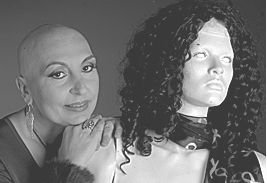

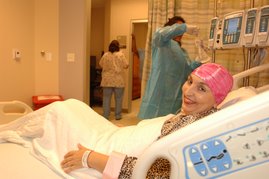
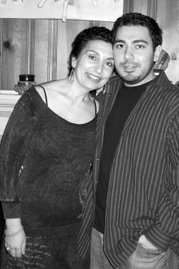

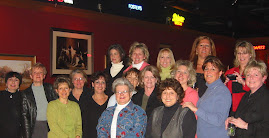







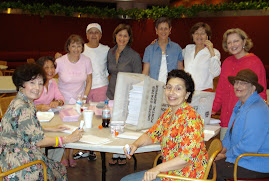














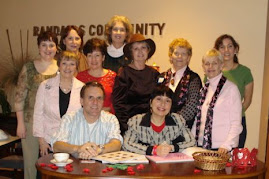


No comments:
Post a Comment